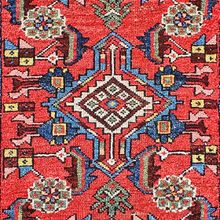Difference between revisions of "Zagheh Rug"
| Line 14: | Line 14: | ||
|Alternative names = Zagheh Carpet | |Alternative names = Zagheh Carpet | ||
| − | |Origin = {{flag|Iran}}: | + | |Origin = {{flag|Iran}}: Isfahan |
| − | |Category = | + | |Category = [[Village]] |
|Prime examples = | |Prime examples = | ||
|Master designers = | |Master designers = | ||
| Line 22: | Line 22: | ||
<!--Technical information--> | <!--Technical information--> | ||
| − | |Common designs = | + | |Common designs = [[Geometric Design|Geometric]], [[Herati Design|Herati]] (Fish) |
|Common motifs & patterns = | |Common motifs & patterns = | ||
|Common sizes = | |Common sizes = | ||
| − | |Common colors = | + | |Common colors = Red, Beige, Blue, Navy Blue |
| − | |Dyeing method = Natural | + | |Dyeing method = [[Natural Dyeing|Natural]], [[Synthetic Dyeing|Synthetic]] |
| − | |Pile material = | + | |Pile material = [[Wool]] |
| − | |Foundation material = | + | |Foundation material = [[Cotton]] |
|Weaving Technique = | |Weaving Technique = | ||
| − | |Knot type = | + | |Knot type = [[Symmetrical Knot|Symmetrical]] (Turkish) |
|Knot density = | |Knot density = | ||
Revision as of 13:41, 12 September 2019
| Zagheh Rug | |
|---|---|
 Design of Zagheh Rug (Rugman) | |
| General information | |
| Name | Zagheh Rug |
| Original name | قالی زاغه |
| Alternative name(s) | Zagheh Carpet |
| Origin | |
| Category | Village |
| Technical information | |
| Common designs | Geometric, Herati (Fish) |
| Common colors | Red, Beige, Blue, Navy Blue |
| Dyeing method | Natural, Synthetic |
| Pile material | Wool |
| Foundation material | Cotton |
| Knot type | Symmetrical (Turkish) |
Zagheh rugs are hand-woven Persian tribal carpets made in the Kurdish nomadic districts of Northeastern Iran. Zagheh is the name given to a group of nomadic people living in the surrounding area of Hamadan. The bright colors and geometric shapes are typical of tribal weaving from this area of Iran. A rug such as this takes a nomadic woman, sometimes working with her daughter, several months of concentrated weaving to complete on a crude loom on the ground outside the family tent. Most rugs woven by tribal people are intended for their own use as floor coverings or sleeping mats. Sometimes, they are put away as security for a day when it may be necessary to trade them in at nearby villages or cities for more practical goods. An authentic and durable work of art, this beautiful rug will last a very long time keeping a room exotic as well as cozy.[citation needed]